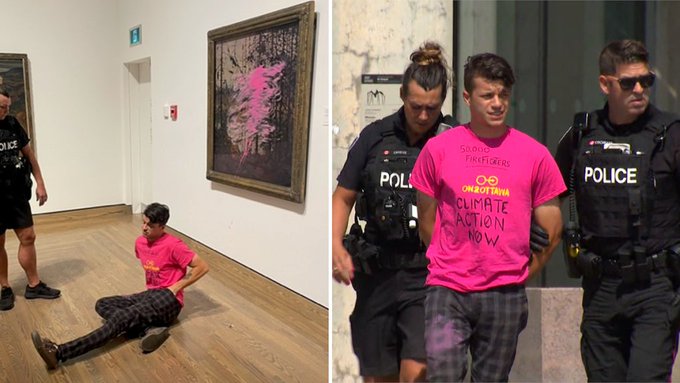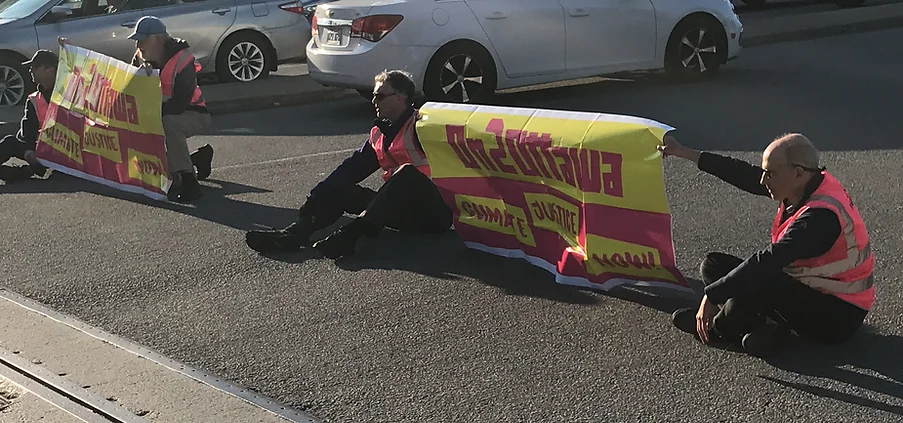
A lot of pink paint got on artist Tom Thomson’s famous Northern River.
A protester without a top stops the Juno Awards by writing “land back” and “save the Greenbelt” across her torso.
Key bridges and streets in Ottawa will be closed.
These are some of the things that the environmental activist group Last Generation Canada, which used to be called On2Ottawa, did to protest. Now, the group is changing its name to match an international network for the climate movement called A22. This is being done as it gets ready for a new wave of direct action and demands in the nation’s capital.
The new name is an improvement on the German name for the same group, which says that this generation is the last chance to stop climate failure and the first chance to make changes in society.
But the group also has members of all ages, from college students to people who are retired. At one of the protests last year, a member who was 87 years old was booked.
Supporter Gillian Graham, 23, told Canada’s National Observer that many of the group’s members are tired of protests, strikes, calls to the government, and petitions. They think that taking direct actions that mess up everyday life and drive governments to do something became the only option.
“Even I’m fed up” At a time when the world is still getting dangerously warm, she said, “Even I realized that the government is not listening to us and is not trying to change” She used Canada’s rising emissions as an example.
The group’s main demand is for a national firefighting body to be set up. This is also what the federal NDP and Green Party want. The group also wants citizen assemblies, which are groups of people chosen to make policy choices and help solve climate problems.
Demands are mostly about making a federal body with 50,000 firefighters that can help provincial wildland fire departments.
The provinces are currently in charge of fighting wildfires, but the federal government can send in the troops if help is needed. When provincial wildfire forces are pushed thin, other provinces or countries step in to help.
The burning season in the United States last year was one of the worst ever. More than two billion tonnes of carbon dioxide were released by Canadian wildfires. This is more than the total emissions of 100 countries.
The season also took a terrible toll on people, with wildfires that were so hot they burned through several towns. Only last year, megafires burned through large parts of Enterprise in the Northwest Territories, Skwlāx te Secwepemcúl̓ecw in British Columbia, and East Prairie Métis Settlement in northern Alberta, among other places.
Canada’s National Observer looked into the human cost of doing nothing about flames last year. They found that Indigenous nations were hit the hardest. Last year alone, more than 95 First Nations villages had to be evacuated. That’s almost twice as many as had to be evacuated during the previous worst wildfire season.
Eight firefighters died on the job last year, which is another reason why Graham says Ottawa needs to do more to make sure that provincial wildland firefighters have a strong federal body to back them up.
Graham said that the government does not like the group’s new wave of protests. One example is Laura Sullivan, a spokeswoman for Last Generation Canada who used to talk to Canada’s National Observer. Graham said she is no longer allowed to talk to the media, post on social media for the group, or give public speeches. Graham also said that Sullivan is no longer under that condition.
Some organisers have been told they can’t go to Ontario or the downtown core of Ottawa, or talk to other people in the group.
“The police repression was so bad,” Graham said about the last round of protests by Last Generation Canada. On the other hand, Graham talks about chats he has had with activists from Last Generation Austria who say that the criminal system in their country gives them a “slap on the wrist” and lets them keep hitting the streets.
In the meantime, she said, some people have said that Canadian cops are too rough, especially with Indigenous and environmental activists in B.C. Some people are worried about the RCMP team known as the Community-Industry Response Group. This group worked with environmental and Indigenous activists at the Fairy Creek logging protests and in Wet’suwet’en territory.
Graham is also aware that the public may not like what the group is doing, such as when they block traffic or accidentally paint over famous works.
According to the work of Harvard political scientist and professor Erica Chenoweth, Graham and Last Generation Canada think that only 3.5% of the population needs to be involved in sustained civil resistance for there to be a 55% chance of good change.
She said, “It’s not necessarily about getting the public on our side,” “That’s not really what our aim is… Our aim is to actually get things done.
“We also don’t want to be doing this. It’s not something that people do to have fun, right? It’s something that we’re trying to do to survive,” she said.
Source – Nationalobserver
